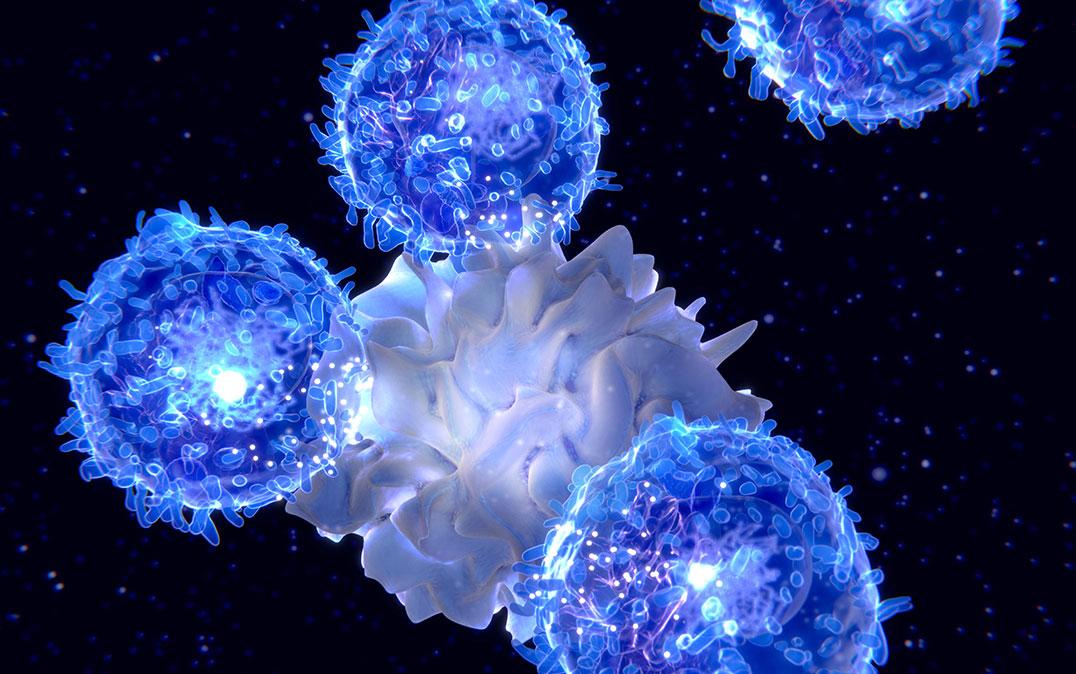Research News
Researchers Find How Immune Cells in the Tumor Microenvironment Make Things Worse (Nature Index: Research highlights in March, 2022)
The Nature Index, a database site operated by Springer Nature, selects one research paper of the researchers belonging to the University of Tsukuba as a Research Highlight from 82 major journals every month. In March, 2022, it featured the above research.
How immune cells are regulated near tumours
Nature Index: Profile page of the University of Tsukuba
Nature Index Research highlights: University of Tsukuba
 Image by Juan Gaertner/Shutterstock
Image by Juan Gaertner/Shutterstock
Researchers from the University of Tsukuba have identified a mechanism that regulates immune cells' infiltration inside tumors and is linked to tumor expansion.
Tsukuba, Japan—Cells from the immune system called CD4+ regulatory T cells, or simply Treg, are linked to tumor prognosis: the more Treg cells present in a tumor, the worst the prognosis. We know from previous research studies that Treg cells can infiltrate into the tumor microenvironment. There, they inhibit anti-tumor immunity, which is the self-defense mechanism that the body puts in place to fight cancer cells, stimulating tumor growth. However, how tumor-infiltrating Treg cells are activated and regulated was, until this study, unknown. A better understanding of how Treg cells contribute to tumor growth is the first step in designing novel therapies for melanoma and many other cancers.
In a study published in eLife in November 2021, researchers from the University of Tsukuba have shown a mechanism through which small particles derived from cells modulate tumor-infiltrating Treg cells.
Extracellular vesicles (EVs) are particles released from cells that are delimited by a lipid bilayer containing functional biomolecules (proteins, lipids, and nucleic acids) that can be transferred to other cells. EVs released from tumor cells (called tumor-derived EVs or TEVs) can act as messengers and are emerging as critical players in tumor progression and metastasis.
"We found that mice deficient in the inhibitory immunoreceptor CD300a on their dendritic cells have increased numbers of Treg cells in tumors and greater tumor growth compared with wild-type mice after transplantation of B16 melanoma", explains Professor Akira Shibuya, senior author of the study. If the absence of the CD300a receptor leads to increased Treg cells, one can conclude that these are related, and the next step of the study was to understand how. By studying cells derived from melanoma, the researchers found that tumor-derived extracellular vesicles are the link they were seeking. They bind to this inhibitory immunoreceptor called CD300a on dendritic cells, stopping them from producing IFN-β, a molecule that activates Treg cells. Therefore, by binding to CD300a, extracellular vesicles suppress the activation of tumor-infiltrating Treg cells and tumor development.
The study also looked at human samples. "To examine the role of CD300A in tumor development in humans, we analyzed the data on the single-cell RNA sequence of human melanoma tissues, showing that higher expression of CD300A was associated with decreased tumor-infiltrating Treg cells and longer survival time in patients with melanoma", says Professor Shibuya. These findings are of particular interest for oncology researchers and clinicians because they may pave the way for boosting the expression of CD300A to avoid the accumulation of Treg cells and consequent tumor development. For patients, their families, and the wider community, these findings point toward potential new therapeutic targets for melanoma and other types of cancer.
###
This research was supported in part by grants provided by the Ministry of Education, Culture, Sports, Science, and Technology of Japan (grant numbers 18H05022 and 16H06387 to AS and 19H03776 and 16H05350 to CN-O)and a grant-in-aid from the Japan Society for the Promotion of Science Fellows (grant number 17J06167 to YN).
Original Paper
The article "Tumor-derived extracellular vesicles regulate tumor-infiltrating regulatory T cells via the inhibitory immunoreceptor CD300a" was published in eLife at DOI: https://doi.org/10.7554/eLife.61999
Correspondence
Professor SHIBUYA Akira
Faculty of Medicine, University of Tsukuba




